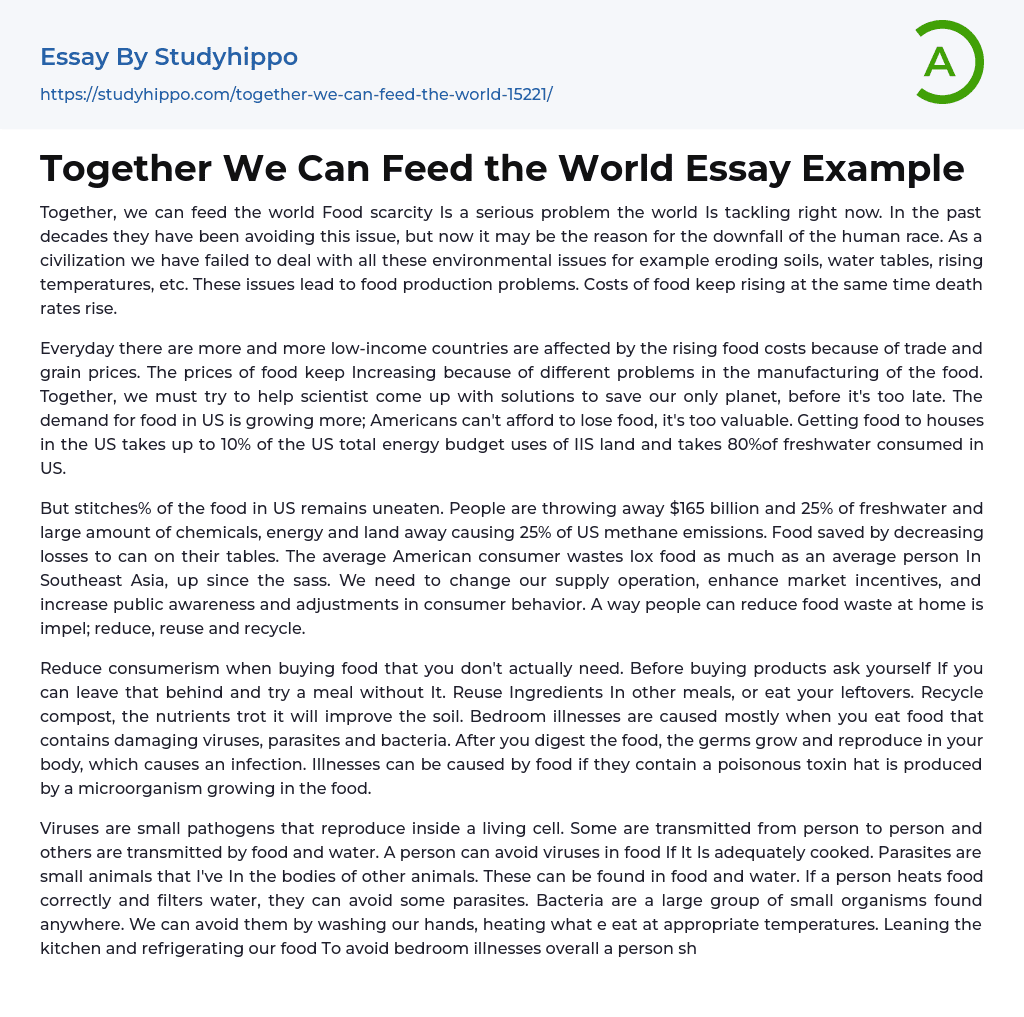The world is facing a severe food shortage issue that has been ignored in recent decades, but now poses a serious threat to humanity. Environmental problems such as soil erosion, declining water tables, and increasing temperatures have not been properly addressed by society. These issues have made it difficult to produce enough food and have led to higher costs and increased mortality rates. Low-income countries are especially affected by rising food costs due to trade and grain prices. The manufacturing process of food also contributes to the rising prices. It is therefore crucial for us to collaborate and support scientists in finding solutions to save our planet before it's too late.
In the United States (US), there is a growing demand for food, making it important for Americans not to waste any. However, distributing food within households requires a si
...gnificant amount of energy and land usage, accounting for 80% of freshwater consumption. Surprisingly, 40% of the US's food goes unused, resulting in a loss worth $165 billion along with substantial amounts of chemicals, energy, and land usage as well as 25% of freshwater resources. Moreover, this wastage alone contributes to 25% of methane emissions in the US. By reducing these losses, we can prevent consumable food from being wasted.
The average American consumer wastes more food than an individual from Southeast Asia on average, a trend that began in the 1970s. To improve our supply operation, we can enhance market incentives and increase public awareness to encourage changes in consumer behavior. One way individuals can reduce food waste at home is by following the principles of "reduce, reuse, and recycle". Before purchasing food products, it's important to
question their necessity and consider preparing a meal without them. Leftover ingredients should be reused or consumed as leftovers. Composting can also be used to recycle nutrients and improve soil quality. Consuming contaminated food can lead to physical ailments caused by viruses, parasites, and bacteria that multiply after digestion, resulting in infections. Foodborne illnesses may occur if toxic toxins produced by microorganisms are present in the food. Viruses are tiny pathogens that replicate within living cells; some are transmitted through person-to-person contact while others through food and water. Thoroughly cooking food helps prevent viral contamination. Parasites are small creatures found inside other animals and can be present in both food and water sources. Properly heating food and filtering water can help prevent parasitic infections.Bacteria, which are tiny organisms found everywhere, have a wide variety of species and are crucial to maintaining overall health. To ensure good health, it is important to practice proper handwashing techniques and cook food at appropriate temperatures. Additionally, keeping the kitchen clean, storing food correctly, preventing cross-contamination, serving hot food hot and cold food cold, and avoiding spoiled food are also essential steps.
With the growing population and increased demand for food production, scientists have been working on various solutions. One company that focuses on finding additional lands for smallholder farmers is Milliner. This is necessary because most fertile agricultural lands are already occupied. Milliner expands its operations to places like Kenya where they cultivate tea and provide training to farmers in order to improve productivity.
This collaboration benefits the farmers by increasing crop yield and enhancing overall food harvesting productivity. Milliner also partners with Rainforest Alliance to work with cocoa farmers in
West Africa and Ecuador. Together, they strive to improve cultivation practices and increase productivity in cocoa farming.
While we may face numerous challenges ahead of us, it is crucial that we find solutions for each of them. If solutions haven't yet been discovered, it becomes imperative for us all to unite our efforts in finding them.Ultimately, it is our responsibility to save our planet and our people. We created the mess, and we must rectify it quickly as there is no time to spare. Food scarcity affects individuals in low-income countries, farmers, and crops. This issue also impacts those of us who waste food at home. As a society, we have a responsibility to address this problem and ensure that everyone has enough to eat.
- Food Safety essays
- Food Security essays
- Beverages essays
- Cuisines essays
- Dairy essays
- Desserts essays
- Fast Food essays
- Bread essays
- Meal essays
- Meat essays
- Organic Food essays
- Rice essays
- Sugar essays
- Taste essays
- Beef essays
- Coconut essays
- Crowd essays
- Dinner essays
- Juice essays
- Sainsbury essays
- Cooking essays
- Ginger essays
- Oreo essays
- Drink essays
- Beer essays
- Wine essays
- Coffee essays
- Tea essays
- Cake essays
- Hamburger essays
- Ice Cream essays
- Burger essays
- Pizza essays
- Fruit essays
- Lemon essays
- Food Waste essays
- Favorite Food essays
- Alcoholic essays
- Soft Drinks essays
- Cookie essays
- Starch essays
- Yeast essays
- Cola essays
- Pizza Hut essays
- snack foods essays
- chips essays
- Biscuit essays
- Brewing essays
- Brewery essays
- Agriculture essays




